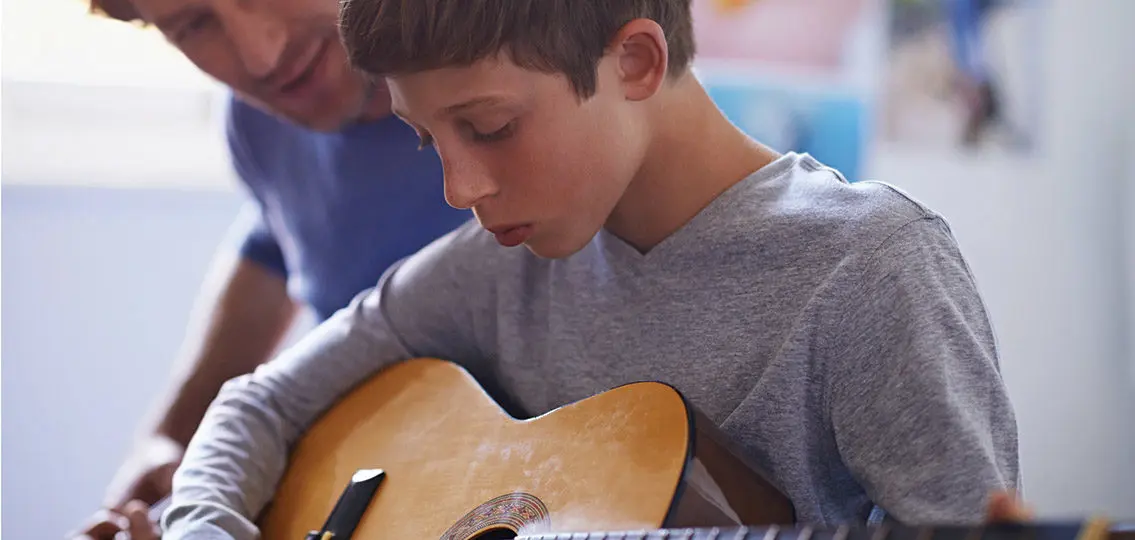Music drives our family. By the time my son began to talk, he was singing along to Bruce Springsteen in the car (which, thankfully, spared us from having to play the Wiggles). I took him to his first jazz festival at around age 5, letting him choose which outdoor stage we would go to. He wandered towards a blues singer and quickly became obsessed with Muddy Waters.
Today, at 14, he plays guitar and trumpet, and whether we’re on road trips or driving to his hockey games, we encourage him to remove the earbuds so we can crank up the tunes as a family. We introduce each other to songs we love, and lyrics help us broach topics that aren’t always easy to discuss, such as relationships, drugs, or politics.
Turns out there’s some solid science behind how sharing my passion for ‘80s music helps me connect with my son.
In one 2018 study published in the Journal of Family Communication, researchers asked young adults how often they listened to music, attended concerts, or played instruments with their parents while growing up. Respondents who reported currently having close parent-child relationships recalled shared musical experiences that took place during childhood and especially the teen years. Even compared to other positive parent-child activities, musical activities played a measurable role in predicting later closeness.
“Music lets us move in time with other people, and there’s pretty good evidence that when we’re physically synchronized with others, we like them more and they like us more,” says study co-author Jake Harwood, a professor of communication at the University of Arizona.
“We were interested in whether that might apply to parents and kids, especially given that in early childhood, music is a big part of parent-child interaction—from singing lullabies to playing musical games—but once you get into adolescence, there’s a lot more variability.”
Research has also shown that music is universal.
It’s a powerful social glue that releases feel-good endorphins in the brain, according to a 2017 study in Scientific Reports. That’s partly why listening to music in the car or at home can help parents and teens relate to each other, says Dr. Jennifer Hartstein, a child and adolescent psychologist in New York.
“Music really brings people together and also brings back memories,” she says. “It’s a great way to create connections between teens and their parents. Parents can share their music and explain why they like it, and teens can share theirs. Saying, ‘Tell me more about why you like that song’ opens conversation without intensity. And it’s a great window for parents into what their kids are interested in.”
Dr. Eva Lazar, a licensed clinical psychologist, says music is one of many ways parents can enhance their relationship with their children.
“We can forge connections with young people through shared interests, whether it’s music, shopping, or fashion, and you can’t go wrong by joining them there in a healthy, meaningful way,” says Lazar.
4 Ways to Connect through Music
1. Get them to play DJ
If your teen automatically retreats into a pair of headphones when you start the car, suggest plugging their device into the stereo. You may get a major eyeroll the first time, but don’t give up, says Hartstein.
“Be persistent. Teenagers are going to make it seem like a chore because that’s their job, but if you make it fun, where the aim is to just enjoy the time together, they will engage in it,” she says.
2. Lower that raised eyebrow
Be mindful about reacting when your teen spins a tune you don’t enjoy, warns Hartstein.
“Don’t say, ‘Oh my God, why do you like this?!’ and be very judge-y about it,” she says. “Instead, be a curious investigator into what your teen is listening to. Be willing to let them explore what they like, and then check it out.”
And if your kid’s favorite song contains offensive lyrics, don’t reach for the skip button, adds Lazar. Instead, discuss the artist’s choices.
“Sometimes we’re not comfortable having our kids listen to provocative music where women are objectified or not respected,” she says. “This can lead to some really important conversations.”
3. Tackle tough topics
Scroll through any teen’s playlist and you’ll find songs about love, drugs, sex, and violence. Don’t shy away from frank discussions about what the tunes are conveying, says Lazar.
“Music sends powerful messages, and it can open up good conversations in a very accessible way: ‘Do you agree with what the musician is saying? Is this meaningful to you or are they off base?’” she suggests asking. “Anytime something’s relevant to a young person, passion is sparked and they want to engage in conversation about it.”
4. Make music a part of your routine
Enjoying music together during ordinary moments is an easy way to reach out to your teen because it’s fun, relaxing, and low-cost, says Lazar.
Lazar and her 17-year-old daughter have gone to several concerts together. While those outings have created great memories, concerts aren’t necessary. “You don’t have to go to a concert to have that shared experience; it can happen in your home,” she says. “It’s about creating memories together with music as the soundtrack of your life.”




